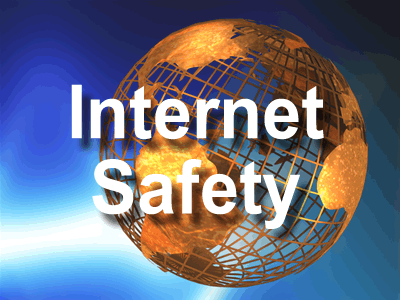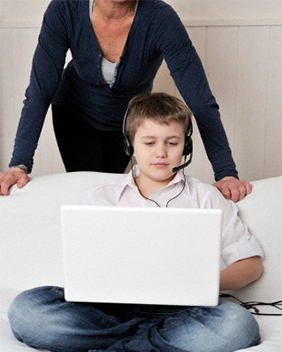 Like most families today, our family sees the Internet is an indispensable part of life as we know it. Letters written laboriously with a pen or pencil? Looking up phone numbers in a 3-inch thick Yellow Pages? Opening up a bound encyclopedia for information? Honestly, I couldn’t imagine going a day without the Internet.
Like most families today, our family sees the Internet is an indispensable part of life as we know it. Letters written laboriously with a pen or pencil? Looking up phone numbers in a 3-inch thick Yellow Pages? Opening up a bound encyclopedia for information? Honestly, I couldn’t imagine going a day without the Internet.
Even with all its charm and convenience, I have to say that seeing my oldest child reach the age where she’s starting to get online makes me more than a little apprehensive.
As a parent, I try to shield her from things that could be dangerous for her, and right now I have complete control over what comes into my home. But when she starts using the Internet, I know that there are lots of sexually explicit or violent images that she could potentially be exposed to.
The boundary between kids and online pornography is dangerously transparent. And it doesn’t just affect kids who are actively seeking out graphic material online. According to the Crimes Against Children Research Center, 25% of children have had unwanted exposure to sexual pictures in the last year.
Kids with their own email accounts, particularly free ones like Hotmail and Yahoo, inevitably get lots of spam ads for penis enlargement and “lonely girls who want to chat with you” delivered right to their inboxes.
Or they could be doing their homework and be exposed to graphic images online by accident. Try it yourself – type a female celebrity’s name into Google and click the “images” link on the upper righthand corner. The odds are pretty good that at least one suggestive or inappropriate image will come up – or more, depending on the celebrity. And Google images does not censor its pictures. Full-frontal nudity and graphic acts show up in image searches, regardless of the age of the child at the computer screen.
To compound the problem, Internet pornography is often much worse than the magazines kids a few decades ago might have passed around at school. Ernie Allen, CEO of the National Center for Missing and Exploited Children, explains that online porn “is not your father’s pornography. It is graphic, it is explicit, it is deviant. It is aberrant. Kids are seeing content that no 12 or 13 year old is mentally, psychologically, or emotionally prepared to deal with.”
If you’re like me, at this point you’re wondering if just shutting off the Internet altogether isn’t such a crazy idea, after all. But it’s not feasible in the long run, and it’s failing to address the real problem. Even if kids aren’t exposed to online pornography in your own home, they could accidentally see it in a friend’s house or even at the computers in the school library. Teach them how to react when it happens: close the browser window and tell you that they’ve seen an explicit image online.
Read More »




 Kids today keep track of their homework assignments, their schedules, and their lives in general on social networks. Just one more reason for parents to keep an eye on their teen's Facebook and MySpace pages.
Kids today keep track of their homework assignments, their schedules, and their lives in general on social networks. Just one more reason for parents to keep an eye on their teen's Facebook and MySpace pages. This past April was National Child Abuse Prevention Month. The month was dedicated to raising awareness about child abuse and, more importantly, to preventing it. The Internet adds a new dimension to child abuse, as children of all ages can become victims of
This past April was National Child Abuse Prevention Month. The month was dedicated to raising awareness about child abuse and, more importantly, to preventing it. The Internet adds a new dimension to child abuse, as children of all ages can become victims of
 In cyberspace, things rarely stay private. A nude picture, snarky comment, or reference to illegal drugs or underage drinking meant for a friend’s eyes only can easily be seen by a
In cyberspace, things rarely stay private. A nude picture, snarky comment, or reference to illegal drugs or underage drinking meant for a friend’s eyes only can easily be seen by a  Like most families today, our family sees the Internet is an indispensable part of life as we know it. Letters written laboriously with a pen or pencil? Looking up phone numbers in a 3-inch thick Yellow Pages? Opening up a bound encyclopedia for information? Honestly, I couldn’t imagine going
Like most families today, our family sees the Internet is an indispensable part of life as we know it. Letters written laboriously with a pen or pencil? Looking up phone numbers in a 3-inch thick Yellow Pages? Opening up a bound encyclopedia for information? Honestly, I couldn’t imagine going  Designed for ages 6 to 14, Club Penguin is a virtual world where kids can play games, earn virtual currency, customize their world, and interact with each other in a kid-friendly environment.
Designed for ages 6 to 14, Club Penguin is a virtual world where kids can play games, earn virtual currency, customize their world, and interact with each other in a kid-friendly environment.
 Chances are that sometime in the last 24 hours you have watched your teen stop whatever they’re doing, whip out their phone to read and fire back a fast and furious text message, then snap the phone shut and get back to work. But how well can they really work on a task when they’re
Chances are that sometime in the last 24 hours you have watched your teen stop whatever they’re doing, whip out their phone to read and fire back a fast and furious text message, then snap the phone shut and get back to work. But how well can they really work on a task when they’re  Older studies reported that the age of the average online gamer was somewhere in the 40s. But now, the age of the average gamer is 32. What does this mean? It means that tweens are entering the mix – and they’re most likely yours.
Older studies reported that the age of the average online gamer was somewhere in the 40s. But now, the age of the average gamer is 32. What does this mean? It means that tweens are entering the mix – and they’re most likely yours.
 Sort of a Tamagotchi-Pokémon hybrid, Neopets is an online game where players earn and spend virtual Neopoints to customize and care for up to 4 colorful cartoon animals.
Sort of a Tamagotchi-Pokémon hybrid, Neopets is an online game where players earn and spend virtual Neopoints to customize and care for up to 4 colorful cartoon animals. In December at an FCC conference in Washington, D.C., the LG Text Education program got recent attention. So I thought I’d check it out.
In December at an FCC conference in Washington, D.C., the LG Text Education program got recent attention. So I thought I’d check it out. The newest Nintendo game console is anticipated to arrive this spring, and it’s pretty different from other gaming systems on the market. Without the
The newest Nintendo game console is anticipated to arrive this spring, and it’s pretty different from other gaming systems on the market. Without the  Around 50% of teens admit to
Around 50% of teens admit to Does your teen have to check her phone the second a text comes in, no matter what she’s doing? Does texting regularly interrupt mealtime and homework time? Does it seem like your teen is constantly “on call”? If so, have you considered the impact texting may be having on her sleep?
Does your teen have to check her phone the second a text comes in, no matter what she’s doing? Does texting regularly interrupt mealtime and homework time? Does it seem like your teen is constantly “on call”? If so, have you considered the impact texting may be having on her sleep? Given the proliferation of teen gamers out there,
Given the proliferation of teen gamers out there,  You don’t need an expert to tell you that you lived a different childhood than your kids do. You remember when you had to get up and turn the dial on the TV to change channels; your teen can’t understand how a world without Facebook or MySpace would even function.
You don’t need an expert to tell you that you lived a different childhood than your kids do. You remember when you had to get up and turn the dial on the TV to change channels; your teen can’t understand how a world without Facebook or MySpace would even function.